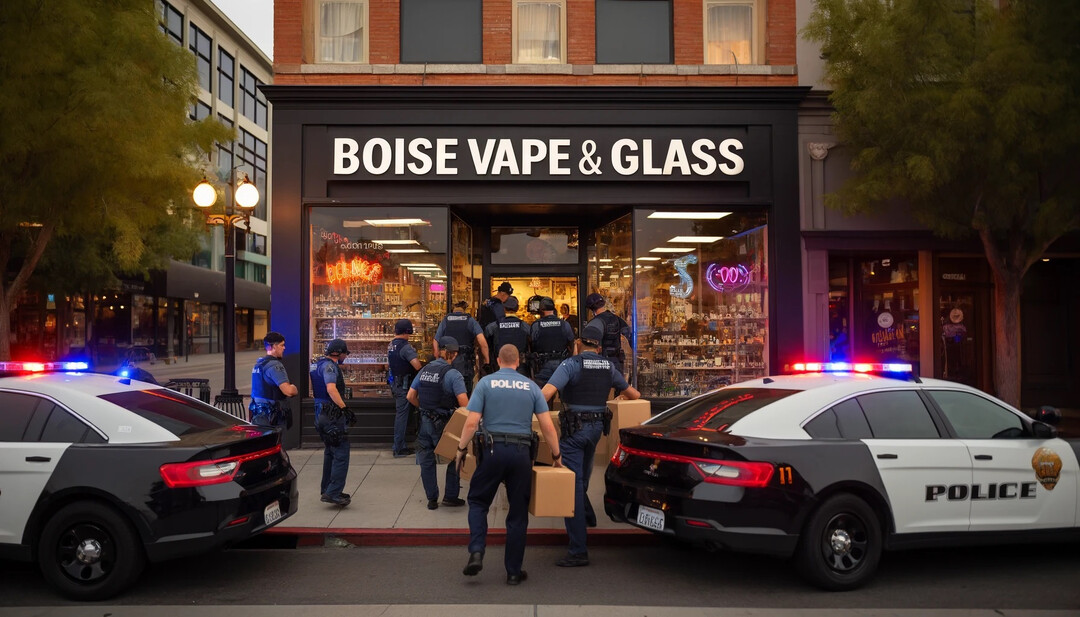
BOISE, ID - High Mountain Smoke Shop, a fixture in Boise for the past five years, shuttered its doors on March 31st, just two weeks after Boise Police informed owner Cody Denton that 85% of his inventory was illegal under Idaho law. Denton told local media that police warned of potential undercover operations and up to nine years in prison per illegal item sold.
The visit to High Mountain Smoke Shop was not an isolated incident. According to Boise Police spokesperson Haley Williams, in recent weeks, the Boise Police Department has visited 55 tobacco and vape retailers in the area, providing education on Idaho drug paraphernalia laws before an anticipated increase in enforcement.
"This year, with increased staffing, the Boise Police Department has had the time to review the business practices of all local tobacco and vape retailers," Williams explained. "The education phase is a proactive step to stop the sale of these items and allow each business to come into compliance with Idaho law before any criminal investigations would take place." While police instructed stores to remove items they deemed illegal within two weeks, they did not provide a specific list for store owners to reference.
Williams stated that the police department would be making its own determinations of illegality based on Idaho Code 37-2734B, which prohibits the "delivery, possession with intent to deliver, or manufacture of drug paraphernalia, with knowledge, or under circumstances where one reasonably should know, that it will be used to introduce into the human body a controlled substance." 1 This interpretation has left shop owners, including Denton, in a state of confusion.
"For years, the police have come into my store multiple times, and not once did they mention anything about my products until the visit on March 13th," Denton lamented. "They said it was okay for so long, and then they just flipped the switch." Ultimately, he was forced to close his shop as he could no longer sell the majority of his stock. "This store was our family's primary income," Denton said. "We have another small store in Oregon, but it doesn't do nearly as much business. The Boise store was our lifeline, and now this has put two other employees out of work as well."
Isaac Lopez, general manager of Durity Distribution, a tobacco and vape wholesaler based in Boise, also expressed his "shock" at the sudden crackdown. He stated that many store owners in the area share his bewilderment and voiced concerns about the abrupt enforcement. "Police have even threatened our employees, saying, 'Selling this stuff is a felony, and you could face a $30,000 fine,'" Lopez claimed. The items in question include glass pipes, metal pipes, wooden pipes, grinders, dab torches, rolling papers, 510 thread batteries, and silicone containers – items that have been legally sold in tobacco shops for years and have legitimate uses.
So, what prompted the sudden change in the police department's approach? Williams explained that the review of "the business practices of all local tobacco and vape retailers" began after the arrest of the owner of PB's C-Store, a convenience store located across from Boise State University's campus, on drug-related charges. In March 2024, the Alcohol Beverage Control cited the store for selling alcohol to minors and subsequently discovered "a large amount of illegal drug paraphernalia" being sold. The owner, Paramjit Singh, 50, faces six felony counts of delivery or possession of a controlled substance or drug paraphernalia.
Williams also noted that increased police staffing this year has allowed the department to dedicate more time to inspecting tobacco and vape shops. "Through several investigations, the Boise Police Department has determined that many local tobacco and vape retailers have been selling illegal paraphernalia for years with little to no oversight," she stated. Some shop owners claim they have been operating without issue for years and believed their products were legal.
Lopez pointed to the ambiguity of the Idaho law itself and its interpretation by the police as the central issue. Many of the items he mentioned are popular among users of legal products like tobacco and CBD, while also having the potential to be used with illegal substances like marijuana. Drake Fisher, owner of Durity Distribution, questioned the fairness of the law's application, asking, "If someone buys a gun and shoots someone, do we make guns and knives illegal? Or do we blame the person who used it that way?" Vape Loft, located on Boise's Milwaukee Street, was also forced to remove some items from its shelves following police instructions.
Williams clarified that in some cases, whether a product violates the statute is obvious. "Sometimes it's as simple as the manufacturer stating the item is for cannabis use only," she said. However, in other instances, it's not just the product itself but "other items being sold and the totality of the circumstances" that can be problematic. "In many cases, the pipes and bongs being sold have no correlation to tobacco use, and the manufacturers specifically label them as marijuana or 'weed' bongs," Williams added.
Furthermore, she noted that many stores sell little to no loose-leaf tobacco due to low demand. "These are the examples of why the Boise Police Department has been meeting with store owners directly to explain the situation and provide contact information for any questions," Williams explained. She used the example of a digital scale, stating that a legal item could be considered drug paraphernalia "if it's being sold alongside items that are specifically made for cannabis use."
Lopez argued that this vague interpretation of the law places a significant burden on store owners. He stated that in his ten years in the tobacco industry in Boise, attempts to obtain clear guidelines from authorities have been futile. He mentioned that his lawyer previously contacted the Ada County Prosecutor's Office and the Boise Police Department to seek clarification on the legality of products, but "they said they don't provide legal advice and are not obligated to clarify the law." Fisher echoed this sentiment, adding, "I've heard that answer probably 15 times in the last decade when inquiring about different products."
The Boise Police Department has stated that the decision to increase enforcement was an internal one. Other local law enforcement agencies do not appear to be making similar moves. For example, the Nampa Police Department told local media that there has been no change in their approach to tobacco shop enforcement. "One of the problems in Idaho is that this information isn't readily available. Their statutes are very vague," Fisher criticized. Lopez indicated that Durity Distribution is working with its attorney and considering filing a civil lawsuit against the Boise Police Department regarding the recent enforcement.
[Copyright (c) Global Economic Times. All Rights Reserved.]




























